It looks like you're using an Ad Blocker.
Please white-list or disable AboveTopSecret.com in your ad-blocking tool.
Thank you.
Some features of ATS will be disabled while you continue to use an ad-blocker.
share:
That's just it, I can work with that line of thinking... but the constantly changing narrative plus the imminent doom and gloom predictions make
impossible for many people to sign on..
In my lifetime.. Global cooling new ice age in 30 years, then global warming we have 20 years to fix this, then it became global climate change, then it shifted again to every bad storm is the result of the climate change.
I personally prefer to be as far away form people as possible and try to live in balance with the world around me, so I am all for protecting the planet and the animals (I am a hunter, responsible hunting is imperative for healthy animal herds), but stop peeing on my head and telling me its rain. (in reference to Al gore)
lot of the science goes right over my head, have no problem with admitting that.. but couldn't an active volcano under Antarctica be a major cause of the ice shifting off the land into the water?
In my lifetime.. Global cooling new ice age in 30 years, then global warming we have 20 years to fix this, then it became global climate change, then it shifted again to every bad storm is the result of the climate change.
I personally prefer to be as far away form people as possible and try to live in balance with the world around me, so I am all for protecting the planet and the animals (I am a hunter, responsible hunting is imperative for healthy animal herds), but stop peeing on my head and telling me its rain. (in reference to Al gore)
lot of the science goes right over my head, have no problem with admitting that.. but couldn't an active volcano under Antarctica be a major cause of the ice shifting off the land into the water?
originally posted by: Timing
a reply to: defcon5
But for sea ice to increase the air temperature in that area has to get cold enough to freeze the sea into ice. That is what is so hard to understand.
For there to be a global increase in temperature then not even sea ice should be forming.
As the decline in land ice could certainly be due to low precipitation and not allowing land ice to form.
It's simple really... when the land ice melts into the sea due to warmer air, it cools the sea. It's like taking a warm cup of water and adding cold water from your pitcher. The water in that cup it's cold now.
a reply to: Timing
I feel like you are being deliberately obtuse but in case I'm wrong let me try to explain and try to clarify some of this. Yes Polar ice ebbs and flows every year both on land and on the ocean. New sea ice does form in both places each year however the recent increase is largely due to increasing land ice breaking off into the ocean and an increase in number of glaciers flowing from the land into the sea.
Global warming does not mean instantly too hot for winter anywhere. The planet will continue to have cold arctic winters and cold antarctic winters for quite a long time yet. The planet has warmed .8C degrees since the industrial age began, not a lot... yet, but the global temperature continues to rise although at slower rate for the past 15 years or so than previous. The reason for this is that the oceans have been absorbing the heat (one of the candidates for the increase loss of ice from the sheets and growth of sea ice). But even that seemingly small increase in global temps has been enough to cause climate change.
I feel like you are being deliberately obtuse but in case I'm wrong let me try to explain and try to clarify some of this. Yes Polar ice ebbs and flows every year both on land and on the ocean. New sea ice does form in both places each year however the recent increase is largely due to increasing land ice breaking off into the ocean and an increase in number of glaciers flowing from the land into the sea.
Global warming does not mean instantly too hot for winter anywhere. The planet will continue to have cold arctic winters and cold antarctic winters for quite a long time yet. The planet has warmed .8C degrees since the industrial age began, not a lot... yet, but the global temperature continues to rise although at slower rate for the past 15 years or so than previous. The reason for this is that the oceans have been absorbing the heat (one of the candidates for the increase loss of ice from the sheets and growth of sea ice). But even that seemingly small increase in global temps has been enough to cause climate change.
originally posted by: Timing
Once upon a time everyone thought the world was flat until someone sailed over the edge of the earth and came back a few years later with tails of distant lands.
In that time period if you questioned the flat earth theory you would be ridiculed and told you were crazy.
That is what I think about this whole debate. The Great Lakes were still frozen in spring, which is the first time that has happened in decades.
It would be a lot better if the "peer-reviewed" scientist would just come out and admit that they don't know. Instead of calling people who disagree with them "deniers", "flat earthers", and neanderthals that don't understand the "science".
I just hope the future government mandated CO2 scrubbers are stylish.
The theory of the Earth as being flat was driven by religion, not by science. Stop repeating the nonsense that so many before you have claimed.
Science proved that the Earth was spherical back in ancient times. Look up Eratosthenes, who figured out a (vaguely) accurate measurement of the Earth's circumference some two centuries before Jesus was born.
edit on 19Sun, 29 Jun 2014
19:56:43 -0500America/ChicagovAmerica/Chicago6 by Greven because: (no reason given)
originally posted by: WP4YT
originally posted by: Timing
a reply to: defcon5
But for sea ice to increase the air temperature in that area has to get cold enough to freeze the sea into ice. That is what is so hard to understand.
For there to be a global increase in temperature then not even sea ice should be forming.
As the decline in land ice could certainly be due to low precipitation and not allowing land ice to form.
It's simple really... when the land ice melts into the sea due to warmer air, it cools the sea. It's like taking a warm cup of water and adding cold water from your pitcher. The water in that cup it's cold now.
So are you saying that you don't really understand it either?
In the Antarctic, temperatures are far enough below freezing that even with some global warming, temperatures could remain sufficiently cold to prevent extensive surface melting.
m.earthobservatory.nasa.gov...
However, the record to date is not clear enough to make any definitive conclusions about long-term climate trends based on the sea-ice observations alone. Sea ice varies significantly from season to season and from year to year, and the extent of its natural variability is not yet fully known.
a reply to: defcon5
That is what I'm saying!
The scientist don't know all the factors, as far as they know it's completely natural. It's absurd to be pushing governments to levy taxes and cause more economic hardship for people.
Now as far as the ice cores goes, if there was a decrease in land ice for that year you wouldn't know it because that data would be non-existent in the ice core data because the ice melted.
As far as the salinity of the water there is place up around Russia and Alaska where Salt Water and Fresh water meet, but it doesn't blend.
Fresh water run off into the ocean just blends.
That is what I'm saying!
The scientist don't know all the factors, as far as they know it's completely natural. It's absurd to be pushing governments to levy taxes and cause more economic hardship for people.
Now as far as the ice cores goes, if there was a decrease in land ice for that year you wouldn't know it because that data would be non-existent in the ice core data because the ice melted.
As far as the salinity of the water there is place up around Russia and Alaska where Salt Water and Fresh water meet, but it doesn't blend.
Fresh water run off into the ocean just blends.
a reply to: Kali74
But they don't know!
They are saying that there is an increase in ice chucks breaking off, but they don't know. It's only an increase in what they have observed recently, also who's the authority on what the base line is on how many ice chunks break off?
It's absurd to point to that and say, "Hey we need to reduce our carbon footprint because nature and nature-ing."
No It doesn't make sense, because the whole reason for the alarmism is that "Global Temperature over all is going to increase".
If some places are getting hotter while some are getting colder, it's bunk. For Man Man Global Warming to be a real thing global temperatures from all across the global need to have an uptick. It can't be hotter in one place, while being colder in another place, because the theory of Man Made Global Warming means hotter global temperatures as a whole which means hotter winters.
But they don't know!
They are saying that there is an increase in ice chucks breaking off, but they don't know. It's only an increase in what they have observed recently, also who's the authority on what the base line is on how many ice chunks break off?
It's absurd to point to that and say, "Hey we need to reduce our carbon footprint because nature and nature-ing."
No It doesn't make sense, because the whole reason for the alarmism is that "Global Temperature over all is going to increase".
If some places are getting hotter while some are getting colder, it's bunk. For Man Man Global Warming to be a real thing global temperatures from all across the global need to have an uptick. It can't be hotter in one place, while being colder in another place, because the theory of Man Made Global Warming means hotter global temperatures as a whole which means hotter winters.
a reply to: Greven
Well I'm being called a "denier" because I don't believe in Man Made Global Warming, there was also a point that I think Real Science was comparing us to "Flat Earthers" just a few years ago.
I'm being told man made Global Warming is happening which is going to cause the overall global temperature to increase, but I'm being told that it's going to get hotter in some area's while other area's are going to get colder.
The Man Made Global Warming people were screaming how the sea ice is melting as proof, now we are point to the sea ice growing and now it's not the sea ice it's the land ice.
If Antarctica didn't get a lot of snow that winter then there is going to be low land ice mass because there wasn't anything to form the ice.
The other problem is that based off of the previous climate data that we have that we have gained from ice cores and other methods proves that the climate fluctuates naturally and no two periods in time have ever been the same.
Where is the base line for saying everything that is happening in this 150 years is being caused by man?
Well I'm being called a "denier" because I don't believe in Man Made Global Warming, there was also a point that I think Real Science was comparing us to "Flat Earthers" just a few years ago.
I'm being told man made Global Warming is happening which is going to cause the overall global temperature to increase, but I'm being told that it's going to get hotter in some area's while other area's are going to get colder.
The Man Made Global Warming people were screaming how the sea ice is melting as proof, now we are point to the sea ice growing and now it's not the sea ice it's the land ice.
If Antarctica didn't get a lot of snow that winter then there is going to be low land ice mass because there wasn't anything to form the ice.
The other problem is that based off of the previous climate data that we have that we have gained from ice cores and other methods proves that the climate fluctuates naturally and no two periods in time have ever been the same.
Where is the base line for saying everything that is happening in this 150 years is being caused by man?
originally posted by: Timing
If some places are getting hotter while some are getting colder, it's bunk. For Man Man Global Warming to be a real thing global temperatures from all across the global need to have an uptick. It can't be hotter in one place, while being colder in another place, because the theory of Man Made Global Warming means hotter global temperatures as a whole which means hotter winters.
This is hilarious.
Do you, perchance, know what latitudes England sits at?
Halfway to the north pole is 45 degrees North, roughly the border of Montana and Wyoming.
The long Canadian border from Minnesota to Washington State is generally 49 degrees North.
England is almost entirely above 50 degrees North, like most of Russia.
The Arctic Circle begins around 66.5 degrees North.
It should be relatively cold. It's on the ocean and surrounded entirely by ocean. Much of Europe should be cold, as well. At times, it can be. What keeps the temperature more favorable for human habitation is the Gulf Stream, a fast ocean current that brings warmer water up into the northern latitudes.
This stream could collapse, given sufficient degradation of the salinity of the ocean. The salinity is already dropping, as land ice continues to disintegrate and shifts freshwater from land into the ocean. Given enough change, a rising global temperature could cause a decrease in temperatures in Europe.
Do you follow?
a reply to: Greven
I get what you are saying and I get the argument, but nobody has yet come up with a plausible theory as to why all this change is being caused by humans.
The explanation you are giving is that the climate fluctuated a lot in the past, but in the 150 years since we have kept relatively accurate weather records we have seen an uptick in temperature so it has to be caused by man, because the C12/C13 isotope only occurs by the burning of fossil fuels.
When the earth naturally leaks oil and they are now starting to discover that this C12/C13 isotope probably occurs in nature a lot more often than they previously thought.
Not only that, but it still doesn't explain how you can say overall global temperatures will increase 1 degree Celsius(or whatever it is), but then shrug off the expanding sea ice as not being a factor when in reality it shouldn't get cold enough for that sea ice to expand it the rate it is precisely because the Man Made Climate Change theory states that Global Temperatures will increase as a whole.
The sea ice should have stayed melted.
I get what you are saying and I get the argument, but nobody has yet come up with a plausible theory as to why all this change is being caused by humans.
The explanation you are giving is that the climate fluctuated a lot in the past, but in the 150 years since we have kept relatively accurate weather records we have seen an uptick in temperature so it has to be caused by man, because the C12/C13 isotope only occurs by the burning of fossil fuels.
When the earth naturally leaks oil and they are now starting to discover that this C12/C13 isotope probably occurs in nature a lot more often than they previously thought.
Not only that, but it still doesn't explain how you can say overall global temperatures will increase 1 degree Celsius(or whatever it is), but then shrug off the expanding sea ice as not being a factor when in reality it shouldn't get cold enough for that sea ice to expand it the rate it is precisely because the Man Made Climate Change theory states that Global Temperatures will increase as a whole.
The sea ice should have stayed melted.
originally posted by: Timing
a reply to: Greven
I get what you are saying and I get the argument, but nobody has yet come up with a plausible theory as to why all this change is being caused by humans.
The explanation you are giving is that the climate fluctuated a lot in the past, but in the 150 years since we have kept relatively accurate weather records we have seen an uptick in temperature so it has to be caused by man, because the C12/C13 isotope only occurs by the burning of fossil fuels.
When the earth naturally leaks oil and they are now starting to discover that this C12/C13 isotope probably occurs in nature a lot more often than they previously thought.
Not only that, but it still doesn't explain how you can say overall global temperatures will increase 1 degree Celsius(or whatever it is), but then shrug off the expanding sea ice as not being a factor when in reality it shouldn't get cold enough for that sea ice to expand it the rate it is precisely because the Man Made Climate Change theory states that Global Temperatures will increase as a whole.
The sea ice should have stayed melted.
Sea ice has only a small effect on anything. It's already sitting in the water; the best it might do is decrease the Earth's albedo and thus decrease the effect of warming. It could counter balance things. However, you are mistaken if you think that any sea ice trends are new.
The Antarctic maximum sea ice extent has been rising for many years:
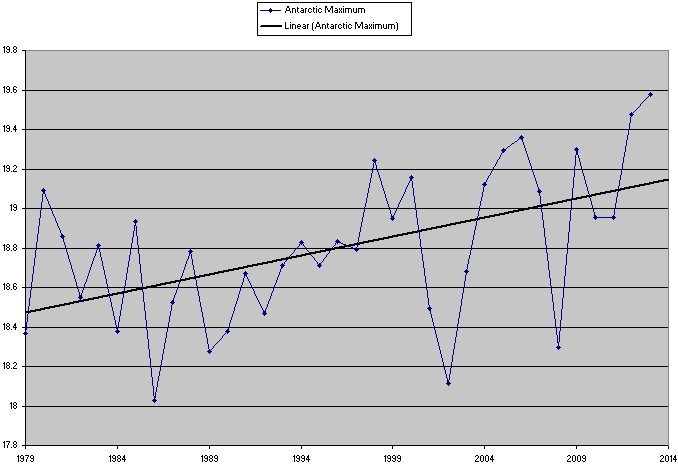
As has the Antarctic minimum sea ice extent:
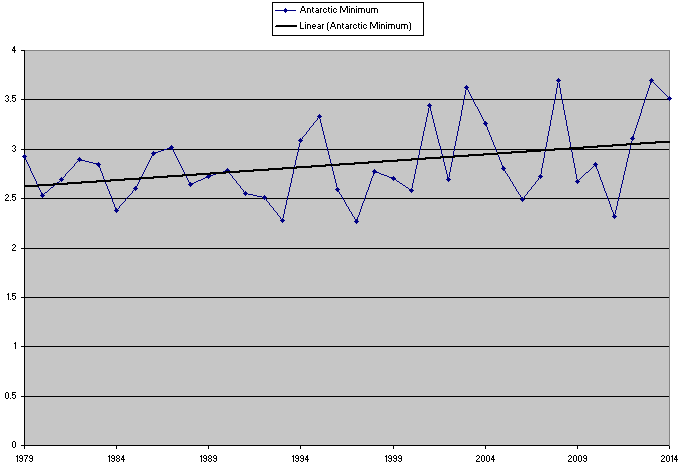
The Arctic minimum sea ice extent has been declining for many years:
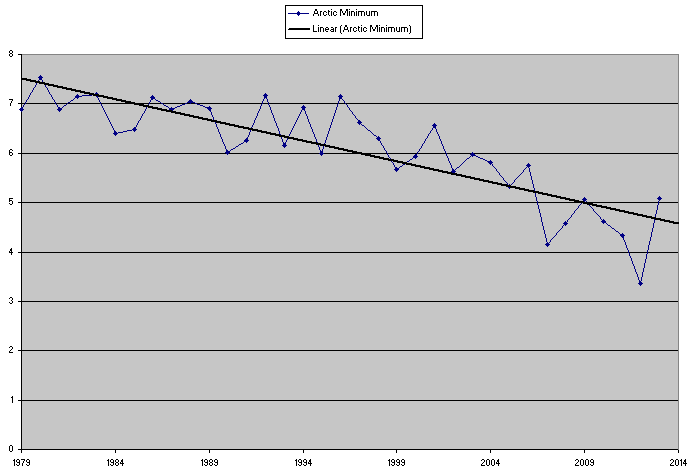
As has the Arctic maximum sea ice extent:
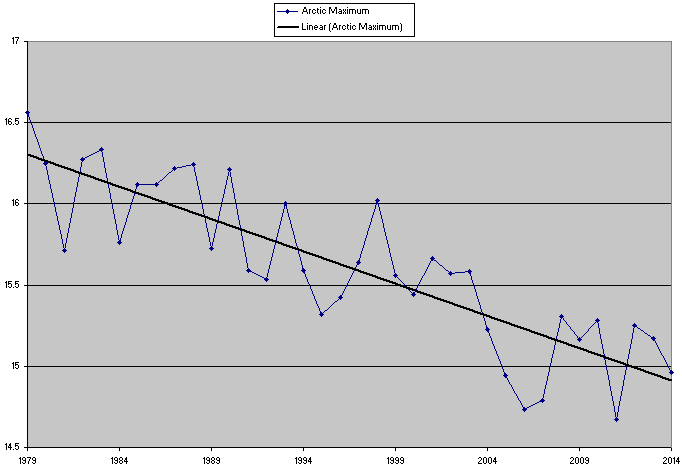
This is a slightly unfair chart, as Arctic minimums and Antarctic maximums (likewise, the reverse, which is what is shown below) usually do not coincide (generally a few weeks apart), but summing the yearly average gets you an overall decline:
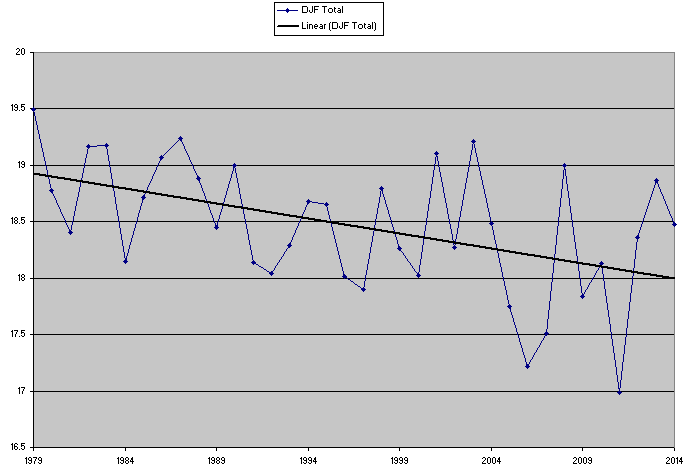
See the problem? Overall sea ice is not actually increasing. Things are happening much differently in the Northern Hemisphere than they are in the Southern Hemisphere.
a reply to: Greven
No, the problem is that just a few years ago they were pointing the disappearance of the sea ice being a key indicator of Man Made Global Warming and the rise of overall Global Temperature.
Now the sea ice is returning which shouldn't be happening because the earth has warmed to the point where the sea ice should still be receding.
Do you see the problem with the logic?
You can throw all these charts and all this "science" from "94%" scientist in consensus, but it still won't explain away the fact that if Global Temperature was increasing the sea ice that already melted and disappeared shouldn't be coming back, because the Global temperature has increased to a point where the sea ice can't form.
See the problem? Overall sea ice is not actually increasing. Things are happening much differently in the Northern Hemisphere than they are in the Southern Hemisphere.
No, the problem is that just a few years ago they were pointing the disappearance of the sea ice being a key indicator of Man Made Global Warming and the rise of overall Global Temperature.
Now the sea ice is returning which shouldn't be happening because the earth has warmed to the point where the sea ice should still be receding.
Do you see the problem with the logic?
You can throw all these charts and all this "science" from "94%" scientist in consensus, but it still won't explain away the fact that if Global Temperature was increasing the sea ice that already melted and disappeared shouldn't be coming back, because the Global temperature has increased to a point where the sea ice can't form.
originally posted by: Timing
No, the problem is that just a few years ago they were pointing the disappearance of the sea ice being a key indicator of Man Made Global Warming and the rise of overall Global Temperature.
Now the sea ice is returning which shouldn't be happening because the earth has warmed to the point where the sea ice should still be receding.
As you can see, sea ice has been decreasing, overall.
As I explained previously, different areas can see different effects, because the system is complex.
The Antarctic sea ice is trending upwards, while the Arctic sea ice is trending even more downwards.
The Earth does not heat uniformly. The Earth is tilted; that plus orbit gives us our seasons. The Earth's orbit around the sun is not even uniform. During the Northern Hemisphere's winter, the Earth is actually closer to the sun than it is during summer in the Northern Hemisphere.
originally posted by: Timing
a reply to: Greven
See the problem? Overall sea ice is not actually increasing. Things are happening much differently in the Northern Hemisphere than they are in the Southern Hemisphere.
No, the problem is that just a few years ago they were pointing the disappearance of the sea ice being a key indicator of Man Made Global Warming and the rise of overall Global Temperature.
Now the sea ice is returning which shouldn't be happening because the earth has warmed to the point where the sea ice should still be receding.
Do you see the problem with the logic?
You can throw all these charts and all this "science" from "94%" scientist in consensus, but it still won't explain away the fact that if Global Temperature was increasing the sea ice that already melted and disappeared shouldn't be coming back, because the Global temperature has increased to a point where the sea ice can't form.
Kali74 already explained it in precise detail:
a reply to: Timing
I feel like you are being deliberately obtuse but in case I'm wrong let me try to explain and try to clarify some of this. Yes Polar ice ebbs and flows every year both on land and on the ocean. New sea ice does form in both places each year however the recent increase is largely due to increasing land ice breaking off into the ocean and an increase in number of glaciers flowing from the land into the sea.
Global warming does not mean instantly too hot for winter anywhere. The planet will continue to have cold arctic winters and cold antarctic winters for quite a long time yet. The planet has warmed .8C degrees since the industrial age began, not a lot... yet, but the global temperature continues to rise although at slower rate for the past 15 years or so than previous. The reason for this is that the oceans have been absorbing the heat (one of the candidates for the increase loss of ice from the sheets and growth of sea ice). But even that seemingly small increase in global temps has been enough to cause climate change.
a reply to: Greven
It doesn't make sense. You can say it's a complex system and write the possibility of a natural change.
I can go grab the ICPP report and show where every year from 2007 and up has been "the hottest on record".
If it was hot enough two years ago to melt the sea ice and create a "hottest on record" headline, what happened last year that caused the sea ice to form and still be called "hottest on record"?
It can't be the "hottest year on record", but the sea ice is forming, whereas the year before it was "the hottest on record" and the sea ice melted.
It doesn't make sense. You can say it's a complex system and write the possibility of a natural change.
I can go grab the ICPP report and show where every year from 2007 and up has been "the hottest on record".
If it was hot enough two years ago to melt the sea ice and create a "hottest on record" headline, what happened last year that caused the sea ice to form and still be called "hottest on record"?
It can't be the "hottest year on record", but the sea ice is forming, whereas the year before it was "the hottest on record" and the sea ice melted.
originally posted by: Kali74
a reply to: FinalCountdown
More sea ice is due to melt and calving into the sea. Growing sea ice is evidence of warming or volcanic activity under the ice, not cooling.
So what about the iceburgs on lake Superior at the start of this June?
Why does that video only show arctic sea ice, what about the ice on the land masses?
Why no mention of the mean average global temperature has not shown any increase for the last 16 years?
Two years ago, Auckland, New Zealand, had snow for the first time in 72 years.
Global volcanic activity has gone up 300% in the last 2,000 years, I surmise that has not been good for the weather.
In Roman times, there was very little glaciation in Norway, did not seem to worry the Romans much.
Why no mention of the mean average global temperature has not shown any increase for the last 16 years?
Two years ago, Auckland, New Zealand, had snow for the first time in 72 years.
Global volcanic activity has gone up 300% in the last 2,000 years, I surmise that has not been good for the weather.
In Roman times, there was very little glaciation in Norway, did not seem to worry the Romans much.
new topics
-
Just spotted an unusual aircraft Melbourne Australia
Aliens and UFOs: 2 hours ago -
The truth lets admit it
Aliens and UFOs: 7 hours ago -
Mass Shooting Towson, Maryland - 7 shot, 1 possibly dead
Social Issues and Civil Unrest: 10 hours ago
top topics
-
Trump formally clinches Electoral College victory
2024 Elections: 15 hours ago, 17 flags -
Mass Shooting Towson, Maryland - 7 shot, 1 possibly dead
Social Issues and Civil Unrest: 10 hours ago, 5 flags -
The truth lets admit it
Aliens and UFOs: 7 hours ago, 4 flags -
Just spotted an unusual aircraft Melbourne Australia
Aliens and UFOs: 2 hours ago, 1 flags
active topics
-
Is this really what is going on?
General Conspiracies • 50 • : Lazy88 -
Russias War Against Religion in Ukraine
World War Three • 28 • : Imhere -
The truth lets admit it
Aliens and UFOs • 14 • : andy06shake -
Mass Shooting Towson, Maryland - 7 shot, 1 possibly dead
Social Issues and Civil Unrest • 10 • : TzarChasm -
Defending the need for adherence to Old Testament commandments under the new covenant of Christ
Conspiracies in Religions • 39 • : ADVISOR -
Could rampant land speculation have caused the Civil War?
History • 40 • : Solvedit -
Something better
Dissecting Disinformation • 45 • : AdultMaleHumanUK -
Elon Musk has Meeting with Nigel Farage at Mar-a-Lago
Regional Politics • 7 • : gortex -
Just spotted an unusual aircraft Melbourne Australia
Aliens and UFOs • 0 • : Cavemannick -
And Here Come the Excuses!!
General Conspiracies • 202 • : andy06shake
